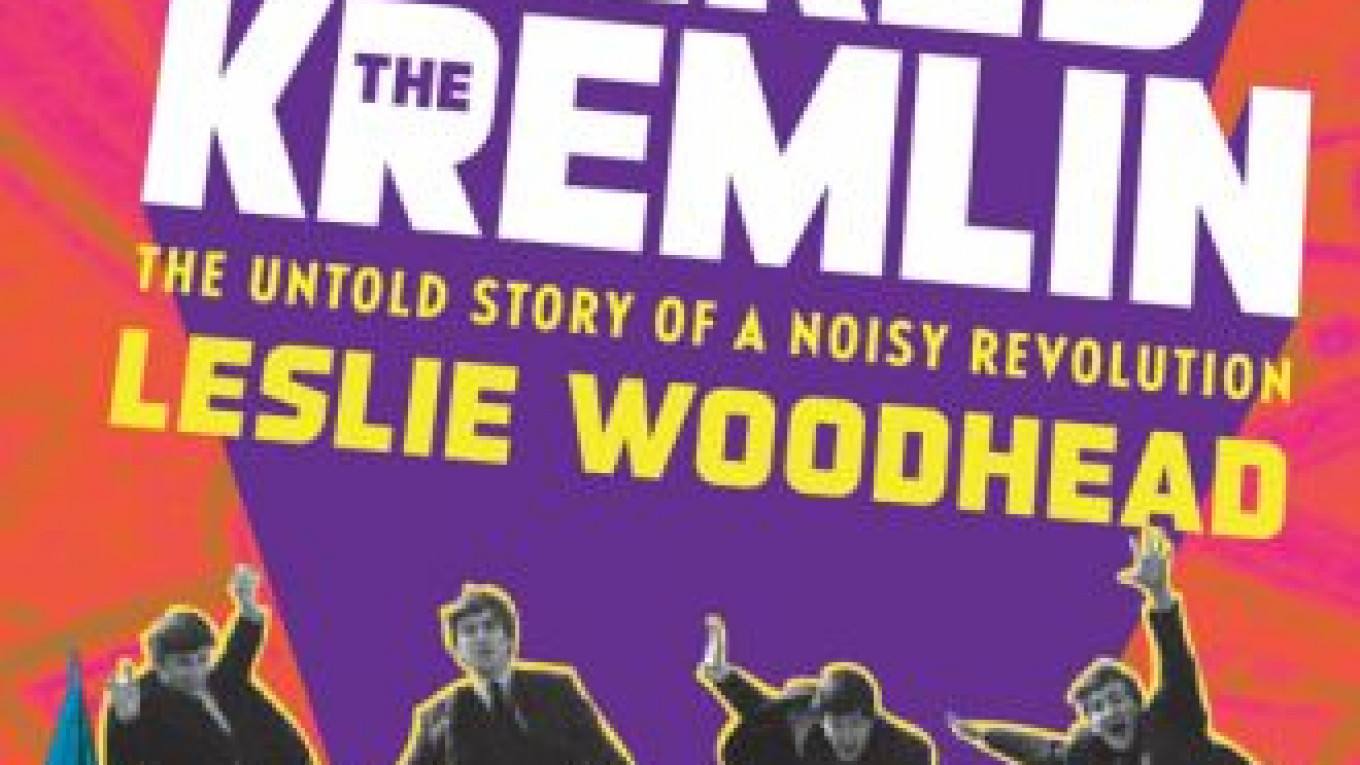"How The Beatles Rocked the Kremlin: The Untold Story of a Noisy Revolution," rockets the reader back to the stagnant times of the Brezhnev era, when the Beatles' music was illegal in the Soviet Union, yet at the same time, bootleg recordings of Paul, George, John and Ringo were influencing and inspiring an entire generation of Soviet youth.
Renowned British documentary filmmaker Leslie Woodhead has recently published a treatise exploring the Fab Four's role in bringing down the Soviet establishment in the second half of the 20th Century.
Woodhead's connection with the Beatles can be traced back to the very beginning: Once a researcher for Granada Television in the North of England, he shot the only surviving film of the band performing an early gig at Liverpool's Cavern Club.
"The little two minute film I shot in the Cavern Club in August 1962," he recalled, "is the first and only film of the Beatles before they became famous."
The intricacies of how a catalogue of 212 songs from Love Me Do in 1962 to I Me Mine in 1970 (the last thing they recorded) could have helped change the direction of the Soviet Union are tricky.
"Of course, the processes by which the Beatles and their music promoted change in the Soviet Union are complex and elusive," said Woodhead. "From Stalinist times, culture had often been an agent for change in a society where other political processes were suppressed and unavailable."
He went on to outline the importance of iconic Soviet and non-Soviet songwriters in the era, particularly those who were anti-establishment.
"[By] figures like Vladimir Vysotsky, music had been enlisted to comment on and criticize a monolithic system, and the Beatles were recruited by successive Soviet generations to be part of that process."
Despite the Beatles not being "directly political," and in an era when numerous Russian fans still had difficulties grasping the meaning behind the lyrics, Woodhead thought that the timing was perfect.
"Their music arrived at just the moment when the hopes of a young generation were being dashed by Brezhnev's crackdowns. What was conveyed through the music, and what was troubling to the Kremlin was a youthful spirit of freedom and unchecked energy," he said.
Woodhead interviewed numerous Soviet Beatles fans and people involved in Russia's contemporary musical life in creating the book.
"Everyone I met from the Soviet Beatles generation emphasized the word Freedom, and talked about how their music somehow freed the 'slave within us.' In St Petersburg, music producer Andrei Tropillo described the process for me with a wonderful image."
He quoted Tropillo: "We understood the message of Beatles music in the way dogs and cats understand us: They don't understand the words, but they catch the feeling."
The Kremlin's repression of the Beatles' music made it even more exciting to Soviet youth, and only served to widen the gap between the state, or the "geriatric leadership," as Woodhead put it, and the freshly enthused teenage fans. Criticism of the music the kids loved was not a wise move.
"Eventually, millions of Soviet young people defected from 'building socialism' to make a new world. As Art Troitsky put it: 'They alienated a whole generation from their communist motherland and prepared Soviet kids for different human values'"
Woodhead thought that to a certain extent, state paranoia over the influx of the upbeat Western music was justified, with the USSR seeing it as a kind of 'seditious force.'
"The Soviet authorities recognized that there was something in the music which challenged their control. As it turned out, the old leaders were right about that, and they also couldn't cope with the feeling that they were being laughed at."
However, things began to change in the detente era. Elton John became the first Western pop or rock act to penetrate the Iron Curtain when he played Leningrad and Moscow concerts in May 1979.
Elton John was considered acceptable, but not the Beatles. Woodhead explained that by the 1970s, the Kremlin recognized that rock music still had to be reconciled with the Soviet system.
"While the spirit and energy of the Beatles remained too risky, musicians like Elton John were felt to be safe and unchallenging. Even so, the authorities tried to insist that Elton should not perform 'Back in the USSR.'"
"When he defied the ban at the end of his final concert and played the song, it unleashed exactly the explosion of uncontrolled enthusiasm the authorities had feared."
In the Internet-free era that was the 1960s, the import and distribution of bootlegged music required some real cunning.
"I was struck by how many Beatles disciples were the sons of privilege," said Woodhead. "Beatles records imported by privileged parents were copied endlessly."
"Radio broadcasts from Radio Luxembourg, BBC and Voice of America were taped and inscribed (at street side recording booths for messages from lonely soldiers) onto the only vinyl available to the kids — X ray plates of Uncle Sergei's lungs."
These "Records on bones" were sold on the streets by racketeers who were often arrested. The mass availability of tape recorders from the mid 1960s turned illegal bootlegging into a "tsunami," he declared.
Despite the widespread and illegal popularity of their music, Soviet authorities would still not relent. It wasn't until the very end of Communism that an album was legally available.
Woodhead pointed out: 'Beatles records became available in successive waves as the authorities tried to control the flood. A single track, 'Girl' was included as a 'Folk song' on a collection called "Musical Kaleidoscope" in 1967, revealing the possibility of the Beatle's 'acceptability.'
However, it wasn't until 1990, 25 years after the first Beatles bootlegs reached the Soviet Union, that the State Label "Melodiya" released a Beatles Album.'
It's easy to understand why the music caught the Russian imagination: a relief from the boredom and drabness of growing up under communism in Minsk or Moscow. The lyrics might have been puzzling, but the gorgeous and addictive songs of the Beatles managed to tap into the inherent Russian passion for melody.
Nowadays, with Soviet communism long gone, there is a degree of Anglomania amongst wealthy Russians who choose to make London their home. The UK's two richest men, according to The Sunday Times Rich List published in April, are the Russian mining and investment tycoon Alisher Usmanov and the industrialist Leonard Blatvik.
However, Woodhead believes this has no roots in pop music: "I think the move to London of so many rich Russians has more to do with personal security and a relaxed tax regime than with a passion for pop music."
Having shot the Rolling Stones's free Hyde Park gig in 1969, he noticed a significant change in rock music.
"The Stones Hyde Park concert planned for July 2013 feels like a perfect metaphor for what has happened to Rock music since the 60s. The essential point of the Hyde Park Concert in '69 was that it was free. Now, the music is owned by Barclaycard — enough said …" he concluded.
Contact the author at artsreporter@imedia.ru
A Message from The Moscow Times:
Dear readers,
We are facing unprecedented challenges. Russia's Prosecutor General's Office has designated The Moscow Times as an "undesirable" organization, criminalizing our work and putting our staff at risk of prosecution. This follows our earlier unjust labeling as a "foreign agent."
These actions are direct attempts to silence independent journalism in Russia. The authorities claim our work "discredits the decisions of the Russian leadership." We see things differently: we strive to provide accurate, unbiased reporting on Russia.
We, the journalists of The Moscow Times, refuse to be silenced. But to continue our work, we need your help.
Your support, no matter how small, makes a world of difference. If you can, please support us monthly starting from just $2. It's quick to set up, and every contribution makes a significant impact.
By supporting The Moscow Times, you're defending open, independent journalism in the face of repression. Thank you for standing with us.
Remind me later.






